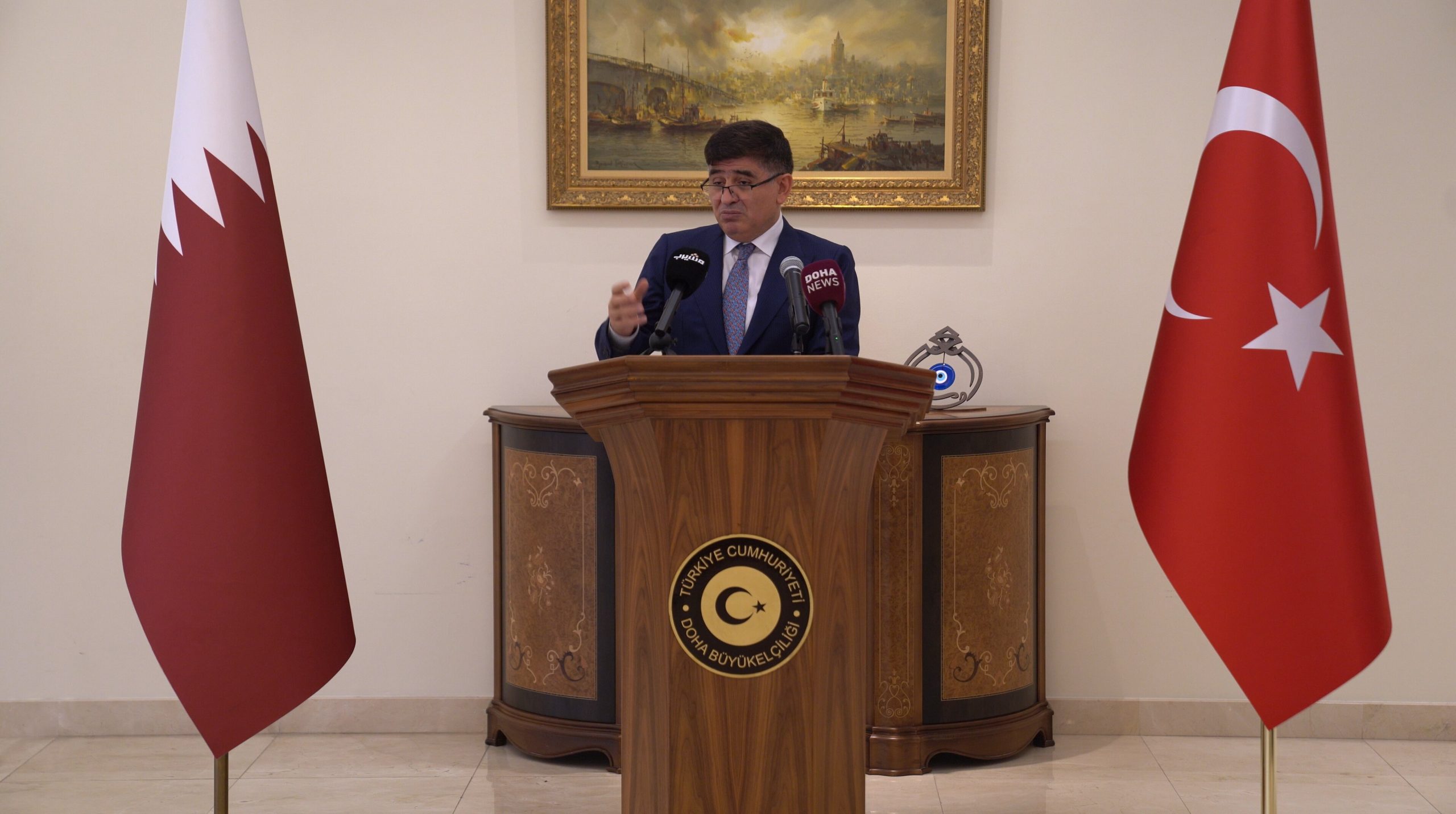Turkish ambassador in Doha praises Qatar Amir on eight-year mark of failed coup attempt in Turkiye

The coup resulted in the killing of 251 Turkish citizens and injured more than 2,000 others. FETO’s members had attacked key government buildings, including the Presidential Complex and the Parliament.
Turkiye’s ambassador to Qatar Mustafa Goksu reiterated his country’s appreciation for the support of Amir Sheikh Tamim bin Hamad Al-Thani to President RecepTayyip Erdogan during the failed coup attempt of July 15, 2016.
“What was important for us that night was that the first leader who called our president was Sheikh Tamim. It was a very important situation for us, because of the stance of Qatar and Sheikh Tamim with us that night,” Goksu told Doha News on Thursday.
Goksu’s remarks came at an event at the Turkish Embassy in Qatar, where he reflected on the past eight years since the failed coup attempt in his country.
The failed coup attempt was carried out by the Fethullah Terrorist Organization (FETO), led by Fethullah Gulen, who has been living in the United States for more than 20 years in a self-imposed exile.
Established in the late 1960’s as a “religious and educational movement”, FETO recruited members mainly through educational institutions.
The coup resulted in the killing of 251 Turkish citizens and injured more than 2,000 others. FETO’s members had attacked key government buildings, including the Presidential Complex and the Parliament.
As the events unfolded, Qatar’s Amir became the first leader to call President Erdogan to express his solidarity with Turkiye and its people. Qatar was also the first Arab country to condemn the coup attempt.
Two weeks later, Qatar’s current Prime Minister and Minister of Foreign Affairs Sheikh Mohammed bin Abdulrahman Al Thani became the first foreign official to visit Turkiye after the events.
“It [Sheikh Tamim’s call] was very important for us. Also, it is unforgettable for the Turkish nation,” Goksu noted.
Looking back at the failed coup attempt eight years later, Goksu said the event prompted the country to re-establish its systems from scratch.
Addressing the press in Doha, Goksu noted that the failed coup attempt enabled Turkiye to overcome challenges, including the Covid-19 crisis and the February 2023 earthquake.
Economically, Turkiye has become among the 20-largest economies in the world and has been removed from the grey list by the Financial Action Task Force (FATF), a move that would boost confidence in the country.
Turkish exports have also soared, reaching $260bn in 2023.
Tourism has played a key role in boosting Turkiye’s economy, with nearly 57 million tourists visiting the country in 2023 alone.
Goksu stressed that the Turkish leadership is working to confront individual cases that attempt to distort his country’s image with its “with its Arab brothers”, underlining Turkiye’s shared religious and historical ties with the region.
Aside from its economic progress, Turkiye’s defence sector has developed to become one with a key global role, particularly after the country developed its self-sufficiency in the sector. Turkiye reduced its dependence on defence technology from 80 percent to 20 percent.
Qatar-Turkiye’s joint efforts in Gaza
As a country that ranks the first among those that provide aid in terms of its gross domestic product, Turkiye has been a key player in the humanitarian response in the Gaza Strip, where Israel’s brutal war has persisted for more than nine months.
Turkiye alone makes up 32 percent of the humanitarian aid rate delivered to the Gaza Strip, dispatching around 56,000 tonnes of humanitarian aid through 13 aircrafts and 12 ships. Around 3,000 people have also been transferred to the country from the Gaza strip.
Aside from its crucial mediation efforts, Qatar has also been at the forefront of humanitarian assistance since the beginning of Israel’s genocidal war.
On December 3, Sheikh Tamim launched an initiative aimed at sponsoring 3,000 orphans and providing medical care for 1,500 injured Palestinians from Gaza.
Since October 7, Israel killed at least 38,584 people and wounded at least 88,881 others, many of which are in need of life-saving medical evacuations.
As strategic partners, Qatar and Turkiye joined efforts in May to deliver aid to the Gaza Strip by launching the Turkiye-Qatar Gaza Goodness Ship.
The ship had set off from the Turkish Mersin International Port to Egypt’s Port of El-Arish, carrying 1,908 tonnes of vital humanitarian aid for the besieged enclave.
The ship carried 1,358 tonnes of aid provided by the Qatar Fund for Development and 550 tonnes donated by Turkiye’s Disaster and Emergency Management Presidency.
Both countries also launched the “Early Recovery Plan” in Gaza, a new initiative announced during the visit of a Turkish delegation to Doha, chaired by Deputy Foreign Minister Yasin Ekrem Serim, between July 2-5.
The joint plan drew inspiration from the recovery plan of the deadly earthquake that struck Turkiye last year.
“Because of the earthquake, we had a big, fresh experience in rebuilding countries and cities. When you compare what we had during the earthquake [in terms of the area] to Gaza, it is 300 times greater than what we did in the earthquake area,” Goksu explained.
“We cannot say rebuild [Gaza] right now, so we say recovery. So we are preparing ourselves to do some plan with the cheapest, fastest way,” he added.
Related
Qatar emphasizes importance of reaching agreement between US, Iran
CAIROQatar's Prime Minister Sheikh Mohammed bin Abdulrahman Al-Thani stressed the critical need for an agreement between the US and
International Women’s Day: Seeking a Balance with Ghada Al Subaey
1309’s Ghada Al Subaey of Qatar celebrates the many layers of femininity in her recent drop, called Labyrinth of Light. This International Women’s Day, the
Discover Ooredoo Plans and Services in Qatar
Ooredoo is the household name in the field of telecommunications and provides a full portfolio of telecom services: mobile plans for everyone, home
What Will The Imminent Qatar Airways Widebody Order Include?
Which Airline Alliance Do You Prefer To Fly With?












